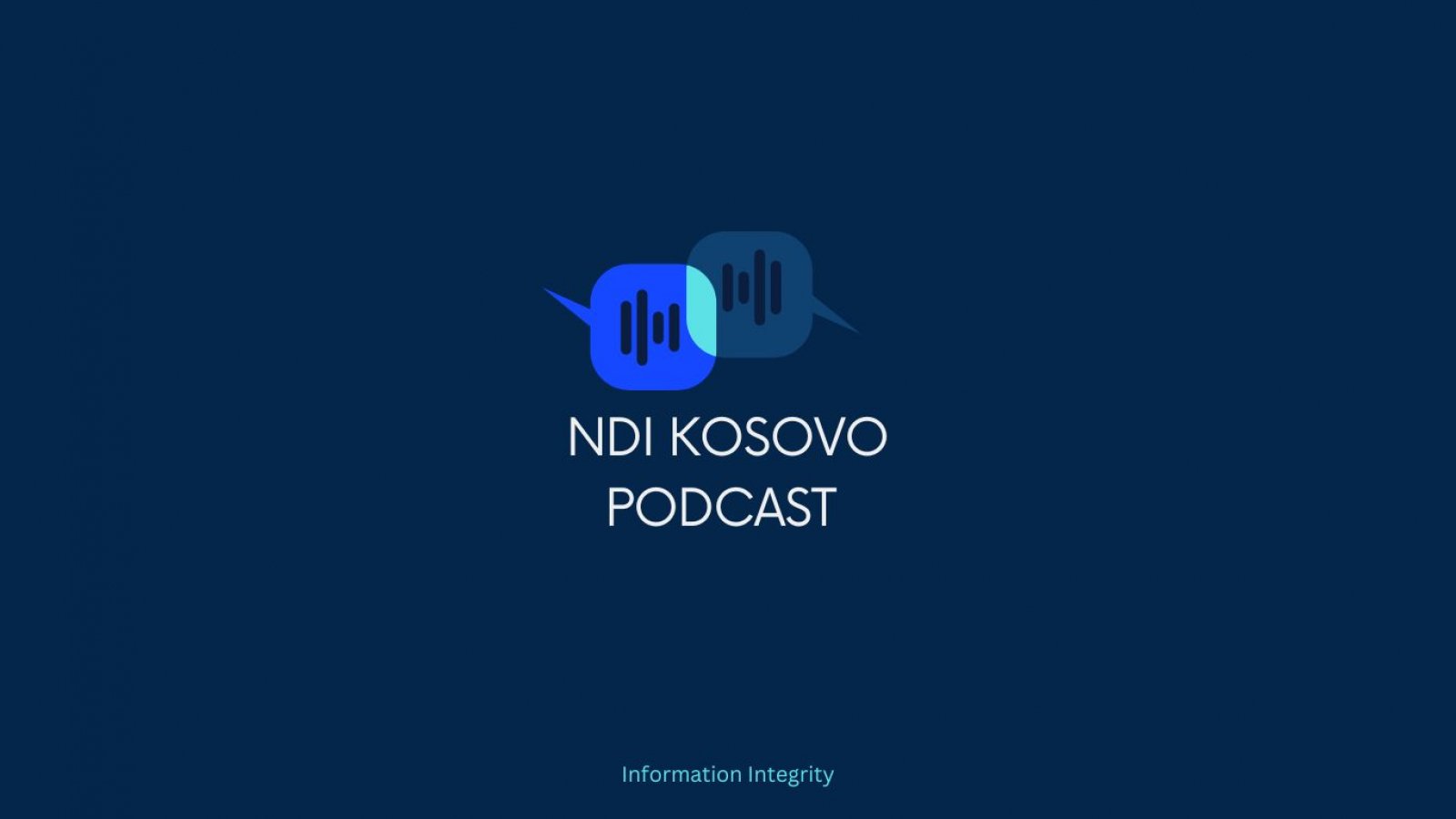
SHARE
NDI’S Kosovo podcast, which encompasses a range of topics including but not limited to digital democracy, the impact of misogyny and sexism as a weapon against women in politics, the prevalence of foreign influences, and the role of journalists in the information war, released its first season in June of 2022. NDI’s Kosovo team works to reinforce and safeguard democracy in the region by working against misleading information and examining how it impacts the international sphere. Misleading information poses a threat to stability in Kosovo and the Western Balkan region, exacerbated by the lack of media literacy skills. This podcast counters that action by fostering online discourse on information integrity and various methods that can be used to secure the information sphere and engage stakeholders in online conversations regarding media literacy and misleading information.
The episodes each cover a different aspect of Information Integrity. The series began with a report that NDI conducted, examined by Pajtim Gashi from NDI Kosovo and Dren Gërguri from the University of Prishtina, in order to introduce the concept of misleading information and the political and media landscape in Kosovo today. Professor Gërguri explained in the podcast that the combination of the lack of basic media literacy and the increase in misleading information and misleading information creates a society that is ‘unarmed’ and thus prone to ‘beliefs’ based on conspiracy theories and false information. Professor Gërguri also discussed the new advancements in technology that contribute to this spread and urged listeners to differentiate between credible journalist-given information and non-journalistic sources, as the latter should not be taken as the truth. This episode sets the tone in which the rest of the podcast develops, laying the groundwork for further discussion.
Subsequent episodes dive deeper into the world of digital democracy and information integrity, unpacking how misleading information affects young people, women, and the general public. Robert Shala of Sentry Cyber Security discusses the “very vulnerable and overloaded” education system in Kosovo with NDI’s Elona Gashi, he notes a greater risk to the stability of Kosovo’s communities and digital security, necessitating media literacy training to equip Kosovo’s youth with skills to identify false and misleading stories as they’re in a vulnerable position. The podcast also explores themes of misogyny and sexism, specifically in the context of online violence against women in politics. NDI Kosovo’s Agnesa Fejzullahu discussed personal experiences with misogyny in the field with Besa Luci of Kosovo 2.0 and Eliza Hoxha, a member of parliament who sits in the Women Caucus in Kosovo. Following a discussion of threats and stereotyping in media, Ms. Luci stressed that “Online violence, or online hate speech against women, very often can also lead to offline violence.” They’ve encouraged women politicians to report violent comments and challenged political players and the media to work toward an inclusive environment for women.
The podcast also explored how misleading information is shaping public opinion in the region and the role of journalists as they work to promote a culture of information integrity. In conversation with NDI, Lulzim Peci, the Executive Director of KRIPED Institute, dove into how Kosovo has been impacted by Russian misleading information using NDI’s Report on Information Disorders. Peci concluded that “Russian propaganda has not managed to do much damage inside Kosovo, but plenty against Kosovo abroad.” Furthermore, this type of misleading information has worked to deepen the ethnic divide between the Serbian community and Kosovo and created instability in the Balkans. This emphasizes the need for journalists in the region, as discussed by guest Getoarbë Mulliqi, Executive Director of the Association of Journalists of Kosovo, who took time to highlight the burdens journalists carry and the importance of their role.
The series concludes with a discussion between NDI Kosovo’s Nikolai Dakovic and NGO Aktiv’s Miodrag Milicevic on the impact of false information on inter-ethnic coexistence in Kosovo. In the larger context of inter-ethnic tensions rising in Kosovo, a disruption in information integrity influenced public opinion on these events and aided in the escalation of ethnic division. Milicevic shared, “The key problem, talking about Kosovo as a multi-ethnic environment, with a still pronounced multi-ethnic distance, the appearance of misleading information often had a negative impact on various social phenomena.” In order to combat this impact, NDI conducted media monitoring in both Albanian and Serbian languages in Kosovo, revealing a high degree of disruption in the integrity of information throughout various political events, particularly those with inter-ethnic connotations. In response to the issues and disarray caused by a collapse in information integrity, Milicevic proposed spreading positive messages and public discourse. Politicians need to play an active role in this, as well as the media, “for their part, would have to do everything in their power to narrow the room for maneuver of different interest groups for the spreading misleading information.”
The first season of NDI’s Kosovo podcast encompassed a variety of topics and helped to initiate discussions on media literacy. In this discourse, critical issues include information disorders, digital democracy, misogyny and sexism, foreign influences, and interethnic tensions. The series engaged stakeholders in these discussions, highlighting the importance of information integrity and offering practical advice to its listeners on navigating the online/media landscape.
Author: Hannah Richards, Project Assistant on the Government Relations and Communication team
###
NDI is a non-profit, non-partisan, non-governmental organization that works in partnership around the world to strengthen and safeguard democratic institutions, processes, norms and values to secure a better quality of life for all. NDI envisions a world where democracy and freedom prevail, with dignity for all.


